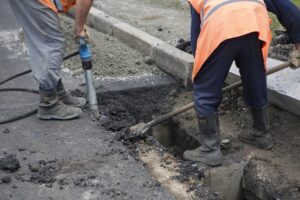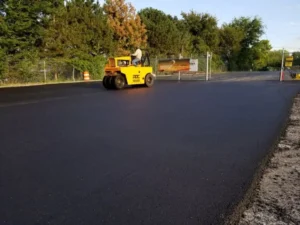No matter what type of pavement you need, asphalt paving can provide you with an economical, beautiful surface in less time than a comparable concrete pavement. Asphalt pavements require little in the way of routine maintenance, and both maintenance and repair procedures can be completed quickly and relatively inexpensively. However, asphalt pavements must be installed correctly if they are to have the proper longevity. There are many factors that contractors must consider when designing an asphalt pavement, and one of the most important of these is determining the total thickness of the asphalt layers.
How Do Contractors Determine the Thickness of Asphalt Paving?
Asphalt paving companies in Texas generally start by determining how the pavement will be used. As a rule, an Austin paving company will look at the weight and volume of traffic to help them calculate the correct thickness of the asphalt layers. However, paving contractors must also evaluate the type and stability of the soil. Unstable soils may need to be amended. Usually, contractors construct an aggregate base to increase the load-bearing capabilities of the pavement. The depth of the aggregate base can influence the thickness of the layers; increasing the base by three inches is roughly equivalent to increasing the asphalt thickness by one inch. Therefore, the thicknesses of the base must be considered when planning how thick to make the asphalt.
Is It Possible to Estimate the Proper Asphalt Paving Thickness for Different Pavement Uses?
Experienced asphalt paving companies in Texas can often provide rough estimates of paving thickness by first determining the planned use of the pavement. For example, they know that an asphalt driveway at a suburban home will typically not need the same pavement thickness as a parking lot for tractor-trailers, and a pedestrian walkway does not need to be as thick as a high-speed, busy highway.
What Asphalt Thickness Is Required for Common Pavement Constructions?
Because there are numerous other factors that could conceivably come into play, your asphalt company may state a range of thicknesses for both the asphalt and the aggregate base.
- An asphalt driveway serving two passenger vehicles typically has between four and six inches of asphalt as well as an aggregate base that is between six and eight inches thick.
- Commercial driveways and lots that must support large trucks usually consist of four to seven inches of paving over an aggregate layer that is a minimum of three inches thick.
- Parking lots for passenger vehicles normally have an asphalt thickness of four to six inches over an aggregate base that is between three and six inches deep.
- An asphalt overlay will probably be between two and three inches. The existing pavement can substitute for an aggregate base.
- Bikeways, walking trails, golf cart paths, and similar pavements that are not used by cars or trucks are usually constructed with asphalt layers between two and three inches if installed over an aggregate base that is between four and six inches thick. If constructed without an aggregate base, the asphalt layers may be anywhere from three inches to five inches.
If you need assistance in the construction, repair, or maintenance of your pavement, rely on the experts at RDC Paving. We offer an extensive selection of services, including asphalt overlay and paving, asphalt crack repairs, asphalt driveways, sealcoating, asphalt repairs, asphalt milling, parking lot striping, concrete curbs, parking lot maintenance, and concrete repair. We are a well-respected Austin paving company with an unblemished reputation for superior workmanship and exemplary customer service. You can request a free quote by filling out the online form or calling 512-920-9155.





